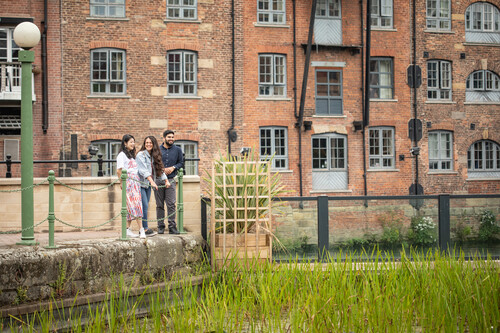Helping organisations demonstrate the health and wellbeing benefits of the natural environment in both urban and rural settings.
The project will be delivered in two phases:-
Phase 1 will work with Natural England to develop an interactive online tool with indicators and metrics that can measure changes in natural capital (benefits of the natural environment), cultural ecosystem services (for example, the non-material benefits people obtain from nature including recreation, aesthetic enjoyment, physical and mental health benefits and spiritual experiences) and wellbeing. This will also help Natural England, regulatory authorities and Local Authorities to monitor progress on local climate, health and biodiversity commitments such as outlined in the 25 Year Environment Plan and the Environmental Land Management scheme.
It will support flood and coastal erosion risk management authorities who need to use indicators to assess the mental health costs of flooding. Outputs will inform the second phase.

Phase 2 will produce a summary of current understanding on how nature-based interventions can be used to promote mental and physical health.
It will provide a visual summary of the volume, quality, and strength of evidence around the benefits of interventions in green and blue spaces such as woods, meadows and parks or rivers, lakes and sea, for health and wellbeing. It will then work with different user groups to develop design principles for a resource that would provide easy access to this evidence.
Workshops and Consultations
A series of workshops and online consultations will be carried out as part of the project to establish design principles that could be applied to developing an evidence resource that is accessible and fit-for-purpose for different user groups. The workshops will include people from public health bodies such as NHS Foundation Trusts and Health and Care Partnerships; Community Interest Companies; providers and managers of green and blue spaces, for example, Councils, Wildlife Trusts, Woodland Trust; Voluntary Community Services organisations; link professionals embedded in GP surgeries; service users and carers.
Literature reviews for indicators of cultural ecosystem services and health and wellbeing
For cultural ecosystem services, a review of the peer-reviewed scientific literature will be undertaken, searching for different forms of cultural ecosystem services in relation to different habitats. For health and wellbeing, due to the large number of studies in this area, the literature searches will focus on existing reviews and key reports. Data on indicators and metrics will be assembled in a spreadsheet, which will be searchable by different categories, such as habitat, indicator category, and ecosystem service category.
Evidence review of nature-based interventions for health and wellbeing
We will create a summary of systematic reviews of the physical and mental health benefits of nature-based interventions in both child/adolescent and adult populations. The evidence map will highlight knowledge gaps and consider the volume, quality and strength of evidence across different interventions and contexts.
The workshops and reviews will inform the contribution of green and blue spaces to improving health and wellbeing indicators in the Public Health Outcomes Framework, which Local Authorities use to benchmark against others. The work will also inform the selection of indicators of health outcomes for green social prescribing initiatives, as well as the design of new green spaces that are conducive to health. This will help to support the development of an integrated methodology for estimating the economic costs and values of green and blue space at catchment level, and be useful for submitting business cases for greening urban developments and post-Covid green recovery.
Phase 1: A report on the indicators of cultural ecosystem services and health and wellbeing is available here:
A spreadsheet of metrics and indicators of cultural ecosystem services is available by emailing Prof. Piran White.
Phase 2: An online and interactive summary of the evidence about nature-based interventions is available below
A report of findings from the nature-based interventions evidence review is also available here:
Project Duration:
September 2021 – December 2022
Project team:
Prof. Piran White, Department of Environment and Geography, University of York (Project lead);
Dr Peter Coventry, Department of Health Sciences, University of York;
Dr Sarah Knowles, Centre for Reviews and Dissemination, University of York;
Prof. Rachel Churchill, Centre for Reviews and Dissemination, University of York
Patricia Darcy, Department for Health Sciences, University of York
Prof. Carolyn Chew-Graham, Faculty of Medicine and Health Sciences, Keele University;
Dr Martin Dallimer, School of Earth and Environment, University of Leeds;
Dr Laura Harrison, Department of Environment and Geography, University of York;
Dr Hannah Armitt, Humber Teaching NHS Foundation Trust;
Dr Caroline Ward, University of York;
Dr Jenny Craven, Natural England.
Partners:
Natural England
Sheffield Health and Social Care NHS Foundation Trust
NHS Sheffield Clinical Commissioning Group
West Yorkshire and Harrogate Health and Care Partnership
Humber Teaching NHS Foundation Trust
Sheffield Flourish
Rotherham Doncaster and South Humber NHS Foundation Trust
Flourish Enterprises
Leeds Mindfulness Co-operative CIC
Simomics Ltd.
